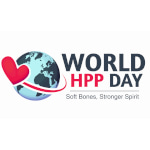World HPP Day Date in the current year: October 30, 2026
 World HPP Day is an annual awareness day observed on October 30. It was created to raise awareness of hypophosphatasia, a rare genetic disorder that affects the bones and can range in severity from mild bone or dental problems to death in utero.
World HPP Day is an annual awareness day observed on October 30. It was created to raise awareness of hypophosphatasia, a rare genetic disorder that affects the bones and can range in severity from mild bone or dental problems to death in utero.Hypophosphatasia (HPP), also known as Rathbun’s syndrome, is a rare inherited metabolic disorder caused by mutations in the ALPL gene. These mutations to deficient activity of the enzyme tissue-nonspecific alkaline phosphatase (TNSALP). This enzyme is essential for bone and teeth mineralization; its deficiency results in the accumulation of substances that interfere with normal mineral deposition.
Hypophosphatasia causes soft, weak, or poorly mineralized bones and teeth, resulting in skeletal deformities, fractures, premature tooth loss, and, in severe cases, respiratory complications or early death. The disease can range in severity from lethal forms in infancy to mild adult-onset cases with recurrent fractures or dental issues.
Depending on the age of onset and symptoms, there are five types of hypophosphatasia: perinatal, infantile, childhood, adult, and odontohypophosphatasia. Perinatal hypophosphatasia is the most severe form, resulting in stillbirth or neonatal death due to respiratory failure or seizures.
Symptoms of infantile hypophosphatasia typically appear within the first six months of life. These symptoms include poor feeding, which results in poor growth, rickets-like symptoms, such as bone softening and deformities, respiratory problems due to chest deformities, and renal problems.
Childhood hypophosphatasia typically manifests between six months of age and early adolescence. Typical symptoms include delayed walking, gait abnormalities, muscle weakness, short stature, bowed legs, frequent fractures, and premature loss of baby teeth before the age of five.
Noticeable symptoms of adult hypophosphatasia usually appear in middle age, though mild symptoms may be present earlier but are often overlooked. Adult HPP is characterized by chronic bone and joint pain, fatigue, muscle weakness or stiffness, recurrent or poorly healing fractures, and dental problems, such as loose teeth or premature loss of adult teeth.
Finally, odontohypophosphatasia is the mildest form of hypophosphatasia because it affects only the teeth, with minimal skeletal involvement. It can develop in childhood or adulthood, causing premature loss of baby or adult teeth, as well as other dental problems.
Hypophosphatasia is a rare disease affecting about 1 in 100,000 people. However, its incidence is likely much higher because mild cases are often misdiagnosed as chronic fatigue syndrome, fibromyalgia, osteoporosis, osteoarthritis, and other more common diseases, resulting in gross underdiagnosis.
World HPP Day was created to raise awareness of hypophosphatasia among medical professionals and the general public to improve diagnosis rates and access to care. You can get involved by learning more about the disease and sharing what you’ve learned with others, donating to an organization that supports patients or funds research, and spreading the word on social media using the hashtag #WorldHPPDay.
- Category
- International Observances
- Tags
- World HPP Day, hypophosphatasia, international observances, awareness days, rare diseases, genetic disorders